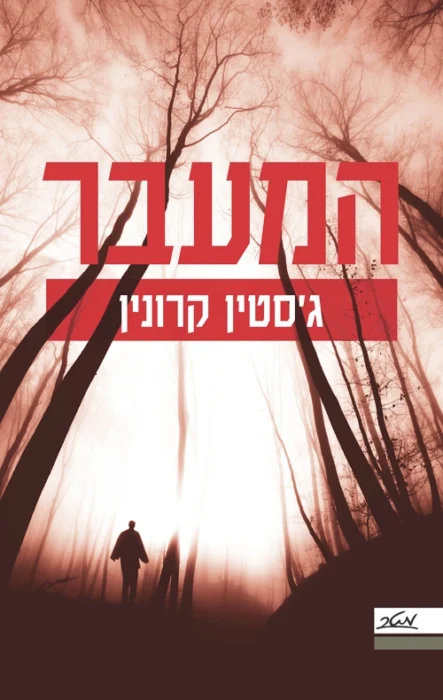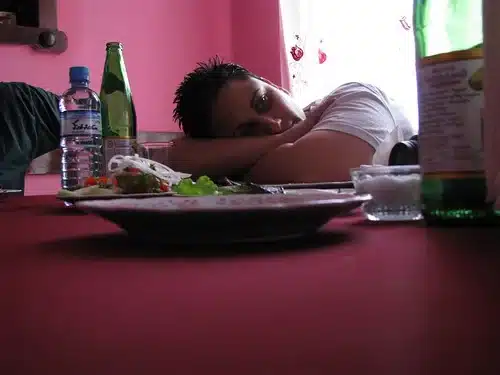Please scroll down for an English review.
המעבר הוא הרבה יותר מסיפור על נגיף קטלני שיצא משליטה. זהו רומן רחב יריעה שמנסה לחשוב מחדש על שאלות של הישרדות, על חברה אנושית ועל משמעות הזמן.
ברובד הראשון זהו ספר על אפוקליפסה: ניסוי צבאי שמשתבש ומוביל לכך שוירוס משתלט על האנושות והיא קורסת. הסיפור נע מהעבר אל העתיד הרחוק כ- 100 ואז 1,000 שנים לאחר הניסוי, קולוניות של בני אדם מנסות לשרוד במציאות שבה נותרו מעט בני אדם, כמעט ללא משאבים והם סגורים במתחמים מוגנים מפני היצורים הנגיפיים.
הצבא ניסה לייצר את החייל האולטימטיבי באמצעות נגיפים שמקורם בעטלפים. חייל שאינו מת, חסין בפני איתני הטבע, מכונת מלחמה אנושית. לצורך כך נבחרו אסירים, מועמדים למוות, "שהתנדבו" לקבל את הוירוס. אלא שמשהו משתבש בחישובים, ומה שנולד מן הניסוי הוא לא אדם־על אלא יצורים שמוחקים את האנושות כמעט עד היסוד.
באמצעות הניסוי קרונין חושף לא רק את חוסר האונים של האדם מול הטבע אלא גם את ערוות החברה האנושית עצמה. האסירים שנבחרו לשאת את הנגיף קיבלו "הזדמנות" להינצל מעונש המוות, אך למעשה החברה מנצלת אותם בשל חולשתם ומעמדם הנמוך. ההסכמה שלהם לא באמת חופשית, וכך במקום גאולה מתקבל ניסוי שיוצא משליטה.
בחלק הראשון של הספר, שמתרחש בעבר, הספר מזכיר לנו את גבולות הכוח האנושי מול הבריאה, וגם את המחיר של חטא היוהרה. הוא מצביע על האופן שבו מוסדות מנצלים את החלשים בשם מטרה כביכול נעלה. על האופן שבו בחסות הסודיות הצבאית מתרחשים דברים לא מוסריים, לא רק בספר אלא גם במציאות שלנו, והמתח בין הרצון לנצח לבין המחויבות המוסרית הוא לב ליבה של הטרגדיה.
ברובד נוסף הספר עוסק בכוחו של הזמן. קרונין מדלג בין עשורים ותקופות, מראה דמויות מזדקנות ונמחקות, קהילות שקמות ונופלות. התנועה הזו מבהירה עד כמה סיפור קטן של אדם יכול להפוך למיתוס, ועד כמה כל פרט בודד נטמע בתוך רצף רחב של היסטוריה. הקריאה כמעט כופה עלינו לחשוב על ההווה מפרספקטיבה של מאות שנים קדימה.
הספר נע בין קו אחד שמתחיל בניסוי ובאסירים שנבחרו, לבין קו אחר שמדלג קדימה עשרות שנים אל מושבות של שורדים המנסים לשמר ציוויליזציה זעירה. המרחב הזה בין "לפני" ל"אחרי" מאפשר לבחון מה נותר מהאדם כשהעולם קורס סביבו.
במהלך העלילה ניכר שהוא מנסה לבחון את המתח שבין המיתי לדתי. השם המעבר רומז לגאולה, לנבואה, להקרבה. הווירוס איננו רק אסון אלא גם פיתוי: מחשבות על חיי נצח, על כוח אלוהי, על גבולות המין האנושי. קרונין בונה אפוס מודרני, כמעט כתבי קודש חילוניים, שבו האנושות יצרה את אלי האפלה שלה במו ידיה.
מה שמחזיק את הסיפור, מעבר לרעיונות הגדולים, הם הרגעים האנושיים הקטנים: חיבה, הורות, בחירות מוסריות פשוטות בתוך עולם חרב. בסופו של דבר גם אחרי האפוקליפסה בני האדם מונעים מאהבה, מקשר, מהצורך לשמור על מי שאיתם.
ולמרות שהאנושות כולה נראית כמחסלת את עצמה, קרונין משאיר פתח לתקווה. גרעין קטן של שורדים נותר, אנשים שמסוגלים, גם אם לא ברור בדיוק למה, לנסות להסיט את ההיסטוריה ממסלול ההרס.
כן, זה ספר תובעני. הדמויות רבות, הזמנים מתחלפים, המבנה לא תמיד מתחשב בקורא. אבל הוא מתגמל. בסיום הקריאה לא נשארת רק תחושת אימה, אלא מחשבה אמיתית על מה זה אומר להיות אנושי ומה אנחנו מוכנים להקריב בשם הקיום.
המעבר/ ג'סטין קרונין
הוצאת מטר, 2013, 824 עמ'
דירוג SIVI –
איכות אודיו –

The Passage #1
לדף הסידרה –
The Passage by Justin Cronin is far more than a story about a deadly virus gone out of control. It is a sweeping epic that seeks to reimagine questions of survival, human society, and the meaning of time.
On its surface, this is an apocalyptic novel: a military experiment goes awry, a virus spreads, and humanity is brought to the brink of collapse. The story moves from the moment of failure into the far future, one hundred years. One thousand years ahead, where small colonies of survivors struggle to preserve a fragile existence in fortified enclaves, cut off from the viral creatures outside.
The military’s original aim was to engineer the ultimate soldier, using viruses derived from bats to create a human who would not die, immune to the elements, a perfect war machine. To do so, they selected death-row inmates who were offered a supposed “alternative” to execution. But the experiment did not produce super-soldiers; it created monsters that wiped out nearly all of humanity.
Through this experiment, Cronin exposes not only human weakness in the face of nature but also the moral bankruptcy of society itself. The prisoners had no real choice; their “consent” was coerced, their vulnerability exploited. Instead of redemption, the result was catastrophe. The novel holds up a mirror to our world, reminding us of how often, under the veil of military secrecy, decisions are made that violate basic morality. The tension between the desire to win and the obligation to act ethically is at the heart of the book’s tragedy.
Another central theme is the power of time. Cronin constructs a structure that spans decades and centuries, depicting individuals aging and vanishing, as well as communities rising and falling. This perspective forces us to consider how a small, personal story becomes myth, and how every detail is absorbed into the vast current of history. The novel urges us to think about the present as though seen from hundreds of years in the future, asking: what will remain of our world?
There is also a mythic and religious undercurrent. The very title, The Passage, evokes redemption, prophecy, and sacrifice. The virus is not only a biological disaster but also a temptation: visions of immortality, godlike power, and human overreach. Cronin constructs a modern epic, almost a secular scripture, in which humanity gives birth to its own dark gods, creatures of its own making.
What sustains the book, beyond its grand ideas, are the small human moments: tenderness, parenthood, courage, moral choices made in ruined landscapes. At its core, the novel insists that even after the end of the world, what drives humanity is love, trust, and the need to protect one another.
And although humanity seems intent on bringing about its own destruction, Cronin leaves a door open for hope. A small remnant survives, capable—though it is never fully clear how of altering the path of history away from total annihilation.
Yes, it is a demanding book. The cast is vast, the timelines shift, and the structure does not always make concessions to the reader. But it is also gratifying. By the end, The Passage is not simply a tale of horror or suspense, but a profound meditation on what it means to be human, and on our last fragile chance to confront creation itself.
לגלות עוד מהאתר Sivi's Books
Subscribe to get the latest posts sent to your email.

